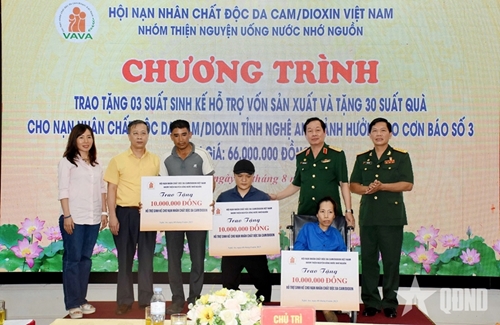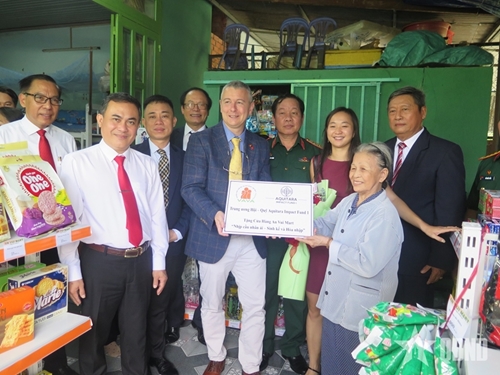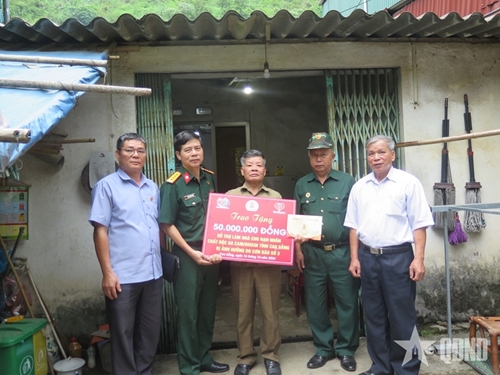In late July 2025, a delegation led by Karl Van Den Bossche, Ambassador of the Kingdom of Belgium to Vietnam, and Lieutenant General Nguyen Huu Chinh, President of VAVA, visited Dong Nai province. The visit aimed to promote cooperation in postwar chemical/dioxin remediation and victim support. The delegation, joined by provincial leaders, attended the opening of three "An Vui Mart" community convenience stores in Tran Bien and Long Binh wards, funded by Belgium's Aquitara Impact Fund 1.
    |
 |
|
Families of AO/dioxin victims in Nghe An province receiving livelihood |
This pilot livelihood model aims to create jobs, increase income, and strengthen economic independence for the families of Agent Orange victims. More than just shops, the “An Vui Mart” stores foster community connections and encourage collective efforts to ease the suffering caused by the toxic chemical.
On opening day, Nguyen Thi Kim, a mother of an Agent Orange victim and owner of the store in Tran Bien ward, tearfully shared how her family had long faced precarious living conditions. Since receiving support to open the store, they have enjoyed a stable income and improved living standards.
According to VAVA, the model has shown promising results and is being evaluated for expansion. General Chinh emphasized that this reflects VAVA's long-term strategy, which follows the motto “give a man a fish and you feed him for a day; teach him how to fish and you feed him for a lifetime.” The goal is to help victims and their families achieve sustainable livelihoods and economic self-reliance.
Belgium has been a strong supporter of Vietnamese Agent Orange victims. In October 2023, its House of Representatives became the first parliament in the world to adopt a resolution supporting them. The Aquitara Impact Fund 1, established in 2024, has facilitated projects for dioxin remediation and victim assistance. In April 2025, King Philippe and Queen Mathilde visited Vietnam and participated in meaningful activities for victims. During the visit, VAVA and the Brussels-Capital Region exchanged an in-principle agreement, creating favorable conditions for sustainable and effective cooperation.
    |
 |
|
Families of AO/dioxin victims in Dong Nai province receiving funding to open “An Vui Mart” |
Fifty years after the war, the consequences of Agent Orange/dioxin used by the U.S. in Vietnam remain severe. The effects have been passed down to the third and fourth generations. Many victims and their families, some with three or four affected members, live in poverty and illness, enduring ongoing hardship.
Since its establishment in January 2004, VAVA has mobilized over VND 4.822 trillion and spent more than VND 4.783 trillion on various initiatives. These include building social protection centers, constructing and repairing houses, caring for victims in centers and communities, granting scholarships, helping victims find jobs, and providing production tools, household appliances, and disaster relief.
From 2024 to the first half of 2025 alone, the association received nearly VND 774 billion in support from domestic and international donors. These contributions embody Vietnam’s tradition of compassion, giving victims hope and confidence to integrate into society.
However, VAVA stresses that beyond one-time gifts and emergency aid, creating livelihoods is key to helping victims stabilize their lives. VAVA leaders view livelihood support as a major policy and a humanitarian mission that requires collective effort from organizations and individuals at home and abroad. An example is the "Improving the Quality of Life for People with Disabilities" project, which includes Agent Orange victims in heavily affected provinces. This initiative, implemented by foreign partners with the National Action Center for Toxic Chemicals and Environmental Treatment (NACCET), has brought practical benefits.
    |
 |
|
VAVA’s representative handing over donation to AO/dioxin victims in Cao Bang province |
Despite limited resources, VAVA has dedicated substantial funding in recent years to building and repairing houses, replacing temporary shelters, and adding sanitation facilities to improve living conditions. The association also provides breeding stock, capital, tools, vocational training, and technical guidance, enabling victims to run small businesses, farms, or provide services. These efforts help them secure stable jobs and incomes.
Supporting livelihoods for Agent Orange victims demands significant resources and, above all, compassion and concrete action from the community and international friends. Such efforts not only help eradicate poverty and ease the suffering of victims but also contribute to the overarching goal of ensuring that “no one is left behind” on the path to integration and development.
Translated by Tran Hoai